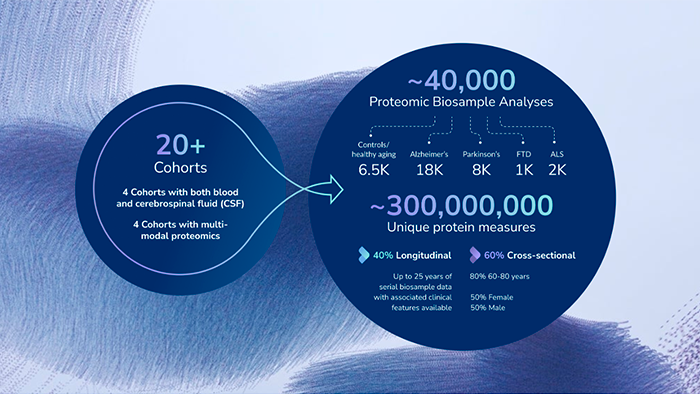15 Jul | 2025
We are part of an international consortium that publishes the largest proteomic analysis of neurodegenerative diseases ever carried out

GNPC consortium cohorts and samples
The early detection and effective treatment of neurodegenerative diseases such as Alzheimer’s remain one of the great scientific and medical challenges of the 21st century. Although the first disease-modifying drugs are beginning to open new therapeutic windows, challenges persist, including silent-phase detection and high patient variability.
With the aim of transforming this scenario, the Global Neurodegeneration Proteomics Consortium (GNPC) has carried out the most comprehensive study of proteomics in human biofluids to date.
The Barcelonaβeta Brain Research Center (BBRC) has contributed to this landmark global study on proteomics in neurodegenerative diseases, led by the GNPC. The work, published in Nature Medicine, presents the first findings from the analysis of more than 35,000 biological samples and includes major contributions from BBRC researchers Marc Suárez-Calvet, Federica Anastasi, Natàlia Vilor-Tejedor, and Marta del Campo.
"At BBRC, we contributed to the GNPC with the proteomic analysis of 1,200 plasma samples from participants in the ALFA cohort, followed longitudinally—a pioneering study in the early detection of Alzheimer’s disease," explains Dr. Marc Suárez-Calvet, Group LEader of the Fluid Biomarkers and Translational Neurology Research Group.
Proteomics: A New Pathway Toward Early Detection and Personalized Medicine
Proteomics—the large-scale study of proteins in fluids such as blood—is emerging as a key tool for understanding the biological processes underlying neurodegenerative diseases. Proteins can reflect the body’s functional state and serve as diagnostic, progression, or treatment-response biomarkers.
In the case of Alzheimer’s, the GNPC’s initial results show that certain plasma proteomic profiles are linked to cognitive changes and accelerated aging in various organs, opening new opportunities for early detection and precision medicine. Moreover, the study identified a robust proteomic signature of the APOE ε4 gene, the main genetic risk factor for Alzheimer’s, which was reproducible across several neurodegenerative diseases such as Parkinson’s, frontotemporal dementia (FTD), and amyotrophic lateral sclerosis (ALS).
“This initiative highlights the power of open science and international collaboration to advance the research and development of more precise treatments for neurodegenerative diseases. Blood proteomics will enable to better understand AD progression and the biological mechanisms underlying AD heterogeneity” says Dr. Federica Anastasi.
The ALFA Cohort and BBRC: A Key Contribution From the Earliest Stages
BBRC’s participation through the ALFA cohort (led by BBRC and promoted by the “la Caixa” Foundation) provided the GNPC consortium with data from a symptom-free population, most of whom have a family history of Alzheimer’s. This unique window into the preclinical phase of the disease strengthens BBRC’s role in the search for early biomarkers to improve diagnosis and enable personalized treatment before symptoms develop.
“Thanks to the proteomic analysis of these preclinical samples, we can identify early signals that go unnoticed with other techniques. This could fundamentally change how we approach Alzheimer’s and other neurodegenerative diseases,” adds Dr. Marta del Campo, director of the Fluid Biomarkers Platform.
GNPC: Open Science to Understand Neurodegenerative Diseases
The GNPC has not only generated an unprecedented resource in terms of data volume and diversity but also demonstrated how collaboration among over 20 academic centers and public-private partners can facilitate the secure, open exchange of biomedical data. This collaborative platform is a unique global initiative with proteomic data from multiple international cohorts on neurodegenerative diseases. It opens new avenues for better understanding disease biology and advance towrads precision medicine.
This study marks a turning point in neurodegenerative disease research, positioning blood proteomics as a fundamental tool for understanding disease mechanisms, discovering new therapeutic targets, and designing more accurate clinical trials.
With this contribution, BBRC reaffirms its international leadership in biomarker research and the early phases of Alzheimer’s. “Participating in an initiative like the GNPC reinforces the impact of our research in a collaborative and open science environment. Validating our cohort data in a global study like this brings us closer to detecting the earliest signs of Alzheimer’s with greater accuracy and developing more effective prevention strategies,” concludes Dr. Natàlia Vilor-Tejedor, researcher and leader of the Genetic Neuroepidemiology and Biostatistics team.
Reference article:
Imam, F., Saloner, R., Vogel, J.W. et al. The Global Neurodegeneration Proteomics Consortium: biomarker and drug target discovery for common neurodegenerative diseases and aging. Nat Med (2025). https://doi.org/10.1038/s41591-025-03834-0









